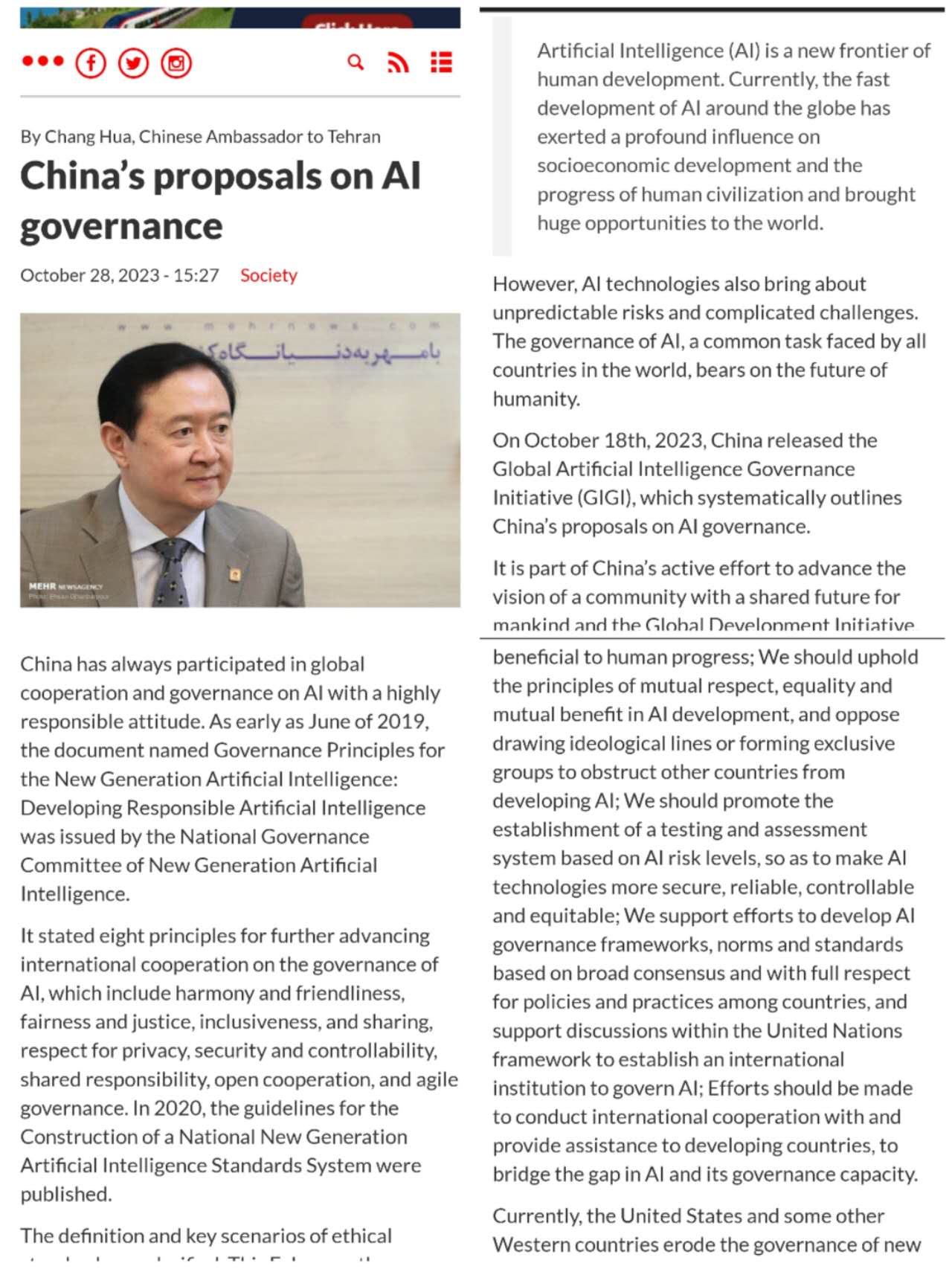On October 28, 2023, Chinese ambassador to the Islamic Republic of Iran Chang Hua published a signed article "China’s proposals on AI governance" in in Iran's Teheran Times . The full text is as follows:

Artificial Intelligence (AI) is a new frontier of human development.Currently, the fast development of AI around the globe has exerted profound influence on socioeconomic development and the progress of human civilization, and brought huge opportunities to the world. However, AI technologies also bring about unpredictable risks and complicated challenges. The governance of AI, a common task faced by all countries in the world, bears on the future of humanity. On October 18th 2023 , China released the Global Artificial Intelligence Governance Initiative (GIGI), which systematically outlines China’s proposals on AI governance. It is part of China’s active effort to advance the vision of a community with a shared future for mankind and the Global Development Initiative, the Global Security Initiative and the Global Civilization Initiative.
GIGI puts forward a total of 11 proposals from three aspects, namely, the development, security and governance of AI.The core components of the GIGI are: We should uphold a people-centered approach in developing AI and adhere to the principle of developing AI for the good of humanity, so that AI is developed in a way that is beneficial to human progress; We should uphold the principles of mutual respect, equality and mutual benefit in AI development, and oppose drawing ideological lines or forming exclusive groups to obstruct other countries from developing AI; We should promote the establishment of a testing and assessment system based on AI risk levels, so as to make AI technologies more secure, reliable, controllable and equitable; We support efforts to develop AI governance frameworks, norms and standards based on broad consensus and with full respect for policies and practices among countries, and support discussions within the United Nations framework to establish an international institution to govern AI; Efforts should be made to conduct international cooperation with and provide assistance to developing countries, to bridge the gap in AI and its governance capacity.
Currently the United States and some other Western countries erode the governance of new frontiers like AI with their hegemonic mentality, overstretch the concept of national security and build “small yards with high fences” with their advantage in science and technology. This has severely hindered developing countries, including China and Iran, from sharing in the benefits of technological development, increasing technological gaps and barriers and intensifying division and confrontation. Certain countries even try to use it as a tool to seek absolute military superiority and intimidate other countries.
China has always participated in global cooperation and governance on AI with a highly responsible attitude.As early as in June of 2019, the documents named Governance Principles for the New Generation Artificial Intelligence: Developing Responsible Artificial Intelligence was issued by the National Governance Committee of New Generation Artificial Intelligence. It stated eight principles for further advancing the international cooperation on the governance of AI , which includes harmony and friendliness, fairness and justice, inclusiveness and sharing, respect for privacy, security and controllability, shared responsibility, open cooperation and agile governance.In 2020, the guidelines for the Construction of a National New Generation Artificial Intelligence Standards System published. The definition and key scenarios of ethical standards are clarified.This February, the Chinese Government released the Global Security Initiative concept paper, which clearly states that China is willing to strengthen communication and exchanges with the international community on AI security governance, promote the establishment of an international mechanism for universal participation, and form governance framework and standards with broad consensus. Now GIGI presents a constructive approach to the ethical governance of AI, which covers all aspects of supervision, R&D and utility and the entire life cycle of AI governance and drew up blueprints for relevant international discussions and rule-making.
Scientific inventions and technological progress have always been a "double-edged sword." As a disruptive new technology, AI has brought huge dividends to the development of human society. However the complex impacts in the economic, military, social and other fields are also increasingly apparent. China stands ready to have exchanges and practical cooperation with all sides including Iran on global AI governance, promote the global AI governance to develop towards a more just and equitable direction, create a more open, shared, transparent and sustainable environment for the innovation and application of AI technology worldwide, and deliver benefit for all human beings through AI technology.

